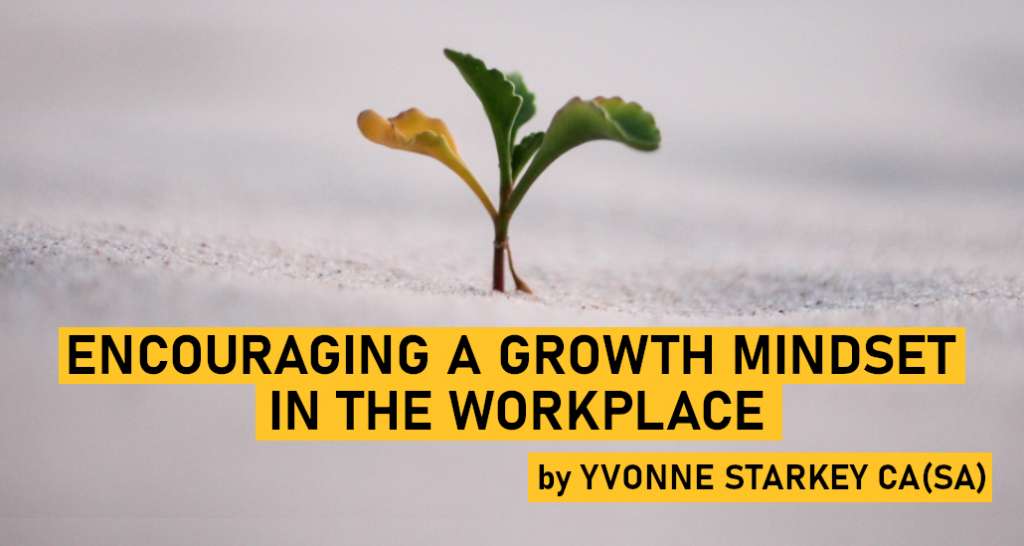Welcome to our latest guest blog post! We are excited to host Yvonne Starkey CA(SA) as our guest author this week – her piece below details some fantastic insights on how to encourage a growth mindset in the workplace and is Part 1 of a 2-part series.
Companies are increasingly referring to the need to develop, encourage and require Growth Mindsets. We’ve seen the motivational posters, heard how valuable it is and how we should strive to develop one. But let’s look at some aspects that are less well-documented and create major expectation gaps and frustrations.
What does a Growth Mindset Look Like?
One of the key elements of someone with a Growth Mindset (I call them Growth’ers) is the instinctive feeling that “I don’t know that… YET”.
This sounds simple and obvious and none of us would argue the logic of this statement. The question is whether we instinctively feel that way in the moment of the challenge, or whether our instinct is to question our intelligence and feel less competent for not knowing.
Simple example:
Part of a task we need to complete is something we haven’t come across before and is known to be complex. We know we’re not competent at it. As we hit that point in the task, we’re facing the unknown and we know that we don’t know what to do.
A Growth’er doesn’t feel bad, negative or feel like they’re less competent at their job in that specific moment.
They know they don’t know it, but they also know that if they ask for help, if they investigate it a little, they’re going to learn how to do it. They don’t question their intelligence, it doesn’t change their confidence in their abilities, and they know that they’ll walk away from the experience knowing a little more than they currently do.
A Fixed’er is more likely to feel bad about not knowing. They may think that they should know it because it was in their studies.
They’re more likely to be anxious about what other people will think about them not knowing, worrying that other people are more competent because they seem to know, and somehow feel. It will probably make them feel less confident.
I want to be clear that mindset is about our instinctive, unspoken response in the moment we face a challenge. If we were asked to complete a survey, we’d tick off the option of “I don’t know it… yet” as our response. But that may be our conscious logic, and doesn’t necessarily represent our instinctive, unarticulated feeling at that moment.
Why is this important?
Our instincts and feelings dictate our actions. In most cases, this is not a conscious decision. We do not get a memo from our brain telling us how we feel and what we’re going to do about it. We move from situation to action without consciously thinking about why we’ve chosen that route.
We may look back over the week and consider our actions and wonder why we never got around to that task we knew we needed to do. That’s because our actions weren’t conscious enough to keep making active decisions. We let the day happen, we get washed away in the chaos, we’re reactive.
We respond to what happens and act instinctively. If we act instinctively, we’re more likely to lean towards decisions that are governed by our mindset.
An instinctive Growth’er is more likely to step forward into uncertain situations. They’re more likely to take on new tasks, jobs, roles that they’re not entirely comfortable with, that they haven’t proven their competence for.
They’re more likely to ask for help or clarification on tasks, and are more likely to try to perform a task they’re not sure of. They’ll take the risk of possibly being wrong.
An instinctive Fixed’er is more likely to step back from uncertain situations. They want to take the task back to their ‘cave’ where they can work through it in safety. They want to be able to reach competence without people knowing how long it took them to get there and without people knowing they made mistakes along the way.
They’re less likely to take up opportunities where they haven’t proven competence, because they feel that it’s irresponsible. (You should only do things that you know you can do!)
They will take longer to ask for clarification or help because they want to figure it out by themselves. More because they’re worried about what other people will think of them, and how they think of themselves. They’re less likely to take risks.
In a world that is constantly changing, where innovation, creativity, adaptability and lifelong learning are concepts that increasingly make the difference between success and failure, having a Fixed Mindset can hold you back. Not only that, it’s also highly stressful.
This article is intended to help you think of Growth and Fixed Mindsets a little more practically, and consider where in the range of ‘Extreme Growth to Extreme Fixed’ you generally fall when it comes to the workplace.
Instead of thinking of the logical response, consider your instinctive responses in the moment of past challenges. Those thoughts and feelings that you’re unlikely to share with others.
In Part 2, we’ll talk about what Growth Mindsets look like on a daily basis in the workplace, and how we can help to foster a Growth Mindset in ourselves, and others.

Yvonne Starkey CA(SA)
Yvonne is a registered CA(SA) and focuses on Mindset and Strategy coaching for students and young professionals working towards their accounting qualifications.
Visit her Accounting Study Advice website here and connect with her on LinkedIn.

Yvonne Starkey CA(SA)
Yvonne is a registered CA(SA) and focuses on Mindset and Strategy coaching for students and young professionals working towards their accounting qualifications.
Visit her Accounting Study Advice website here and connect with her on LinkedIn.
Enjoying the site? Don’t miss our FREE CPD Newsletter – sign up below and stay updated weekly with free CPD content delivered directly to your inbox!
Sign up here:
Disclaimers:
Guest posts and comments represent the diversity of opinion within the Chartered Accounting profession and related industries. The views and opinions expressed in guest blog posts and articles are solely those of the author and do not necessarily reflect the official position of myCAhub™ who shall not be held liable for any inaccuracies presented.
Permissions: The author of any post presented on this site is responsible for obtaining all necessary permissions for publication.
Advice Disclaimer: myCAhub™ does not provide tax, legal, investment or accounting advice. This material has been prepared for informational purposes only, and is not intended to provide, and should not be relied on for, tax, legal , investment or accounting advice. You should consult your own tax, legal, investment and accounting advisors before engaging in any transaction or making any financial decisions.

